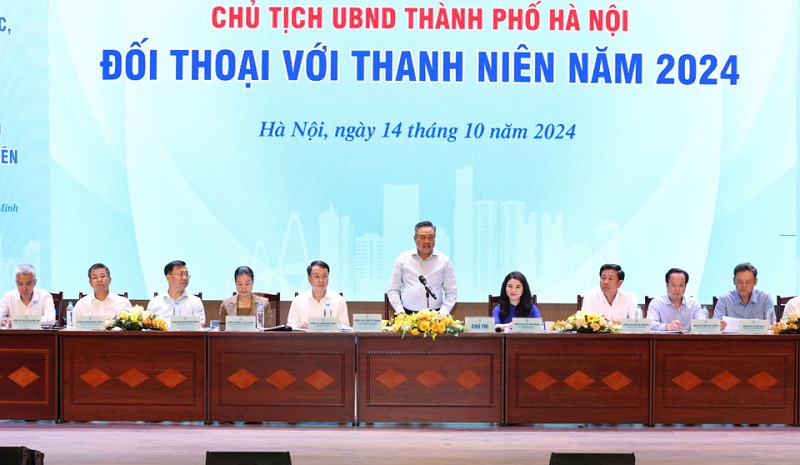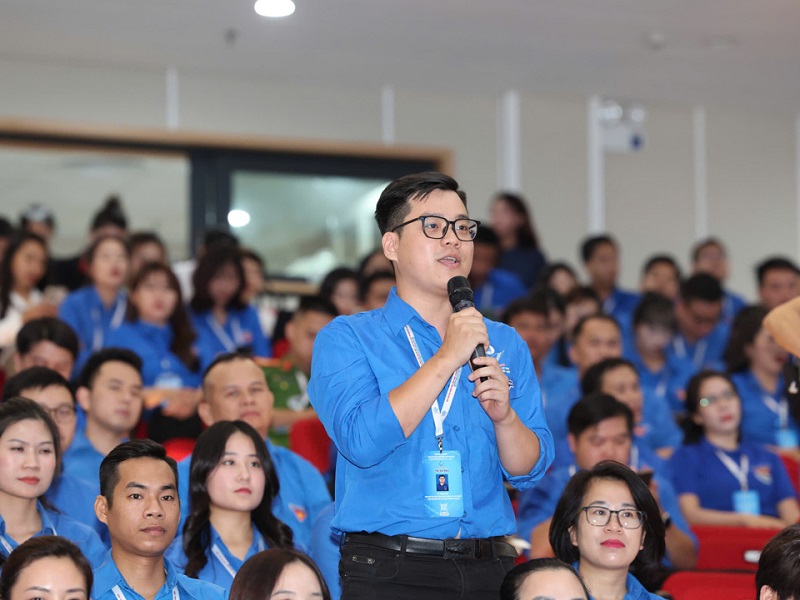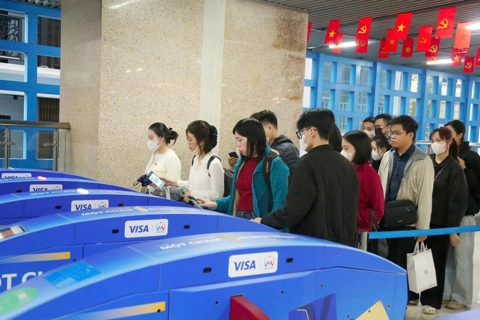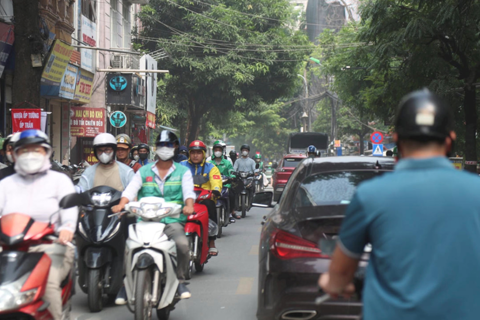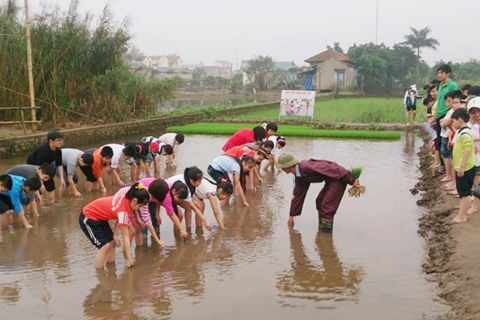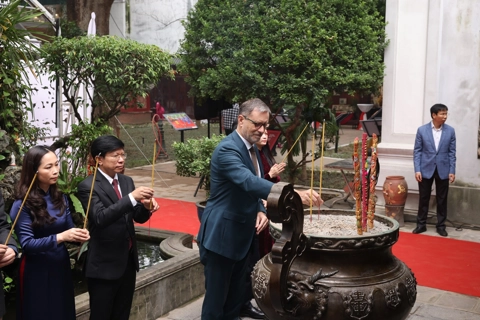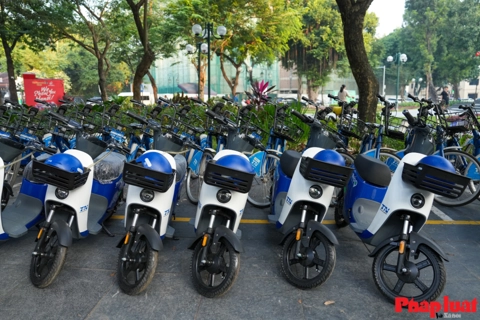For Hanoi's youth, a clean and green environment is paramount
Youth in Hanoi are concerned about the urban environment, urban flooding, and streetscaping.
How to build a green, clean, beautiful, civilized and sustainable Hanoi is a primary concern of the younger generation, a meeting between the Hanoi People's Committee and the capital's youth heard on October 14.
| Tran Sy Thanh, Chairman of the Hanoi People's Committee, chairs the meeting between the city authorities and the youth. Photo: Thanh Hai/The Hanoi Times |
Pham Thu Phuong, Secretary of the Ba Dinh District Youth Union, recalled the severe damage and devastation caused by Typhoon Yagi in late September in Hanoi and other northern provinces.
The joint efforts of citizens in disaster response and recovery reflect Vietnam's deep-rooted spirit of unity and mutual support, she said.
Phuong pointed out that the intensity of Typhoon Yagi and other natural disasters is partly due to climate change, exacerbated by pollution from factories, cars, deforestation and overuse of natural resources.
She questioned the city government and its agencies on what solutions and policies will be in place to reduce pollution in the capital.
Meanwhile, Nguyen Duy Khanh from Gia Lâm District raised the issue of building bio-reservoirs to collect rainwater as a measure to help the city avoid urban flooding.
Le Minh Duc, Secretary of the Trung Tu Ward Youth Union in Dong Da District, emphasized that the use of solar energy to reduce dependence on traditional energy sources is now a trend.
It contributes to a greener environment and modern urban landscapes, he said.
Duc suggested that the city government study, test and install solar-powered street lighting on major roads.
In response, Le Thanh Nam, director of Hanoi's Department of Natural Resources and Environment, said the city has taken five key measures that are currently being rolled out.
The city has worked to protect and improve the urban environment alongside its development plans, clean up polluted lakes and rivers, and expand air and water quality monitoring, he said.
Hanoi has shifted to clean energy, developing smart cities and promoting renewable energy, especially rooftop solar, he added.
"By 2030, Hanoi aims to have half of government offices and residential buildings using self-generated solar power," Nam said.
Building smart urban infrastructure and applying modern technologies in traffic management are the ways to achieve an integrated, user-friendly transportation system, reduce pollution and improve urban efficiency, said the director.
In addition, the city is prioritizing the development of public and green spaces, the renovation and expansion of green areas in the urban core, and the preservation of cultural heritage to build a unique identity for Hanoi, he said.
Nam emphasized regional cooperation and collaboration among all stakeholders as key forces in the fight against pollution.
"We need to build a sense of community responsibility for environmental protection. Young people must take the lead with practical and effective initiatives."
Vo Nguyen Phong, director of Hanoi's Department of Construction, supported the idea of building bio-reservoirs to store rainwater, saying the solution could address multiple problems.
This approach can help regulate and reuse water resources, provide clean water for production and daily use, and reduce pollution and flooding in Hanoi, he said.
Controlling street advertising through technology platform
Ha Tran Trung, secretary of the Duc Thang Ward Youth Union in Bac Tu Liem District, wanted the authorities to work out solutions to remove unauthorized advertisements and flyers on walls and utility poles that spoil the city's aesthetics.
| A member of the youth union raises a question at the meeting. Photo: Thanh Hai/The Hanoi Times |
To address this problem, he suggested that the city expand the model of centralized billboards and explore alternative formats, such as rotating cylindrical billboards.
Trung even offered the idea of creating an online advertising section on district government websites.
"This would be the place where businesses could submit their advertisements for approval before publication," he said.
In response to these ideas, Do Dinh Hong, Director of the Hanoi Department of Culture and Sports, emphasized the use of fines to enforce advertising regulations.
City authorities will work to crack down on individuals and businesses that engage in illegal advertising, he said.
He also hailed Trung's idea of centralized billboards and rotating cylindrical billboards as "very promising solutions".
As for the "online advertising corner" proposal, Hong said it could be a groundbreaking and effective solution.
“This ad corner model will facilitate digital connections between job seekers and employers while improving urban aesthetics and fostering a clean, civilized, and modern environment in the capital," he said.
Bui Phuong Nga, first runner-up of the Miss Vietnam 2018 contest, said that while many young social media influencers have done a good job in promoting Hanoi's cultural beauties, some others have provided negative content that affects the public's mindset, especially the youth, referring to measures for responsible social media behavior.
She asked if the city would introduce mechanisms to encourage quality content while at the same time controlling inappropriate posts.
In response, Nguyen Viet Hung, Director of Hanoi's Department of Information and Communication, acknowledged the challenges of fighting harmful content on platforms with servers located overseas.
He said there are measures in place to deal with those who violate the laws in this area while creating engaging content for the youth.
"There are several successful models, such as the Government Portal's Facebook page and the Nhan Dan (People) newspaper, which have generated great interest among the youth," he said.
The department has advised the city government to promote positive content on social media, following these models, Hung said.
"With such collaborations, we can creatively use mainstream media to 'promote the positive and eliminate the negative' on social networks," he said.
Positive, healthy information will increasingly spread through social media, ultimately shaping better attitudes and behaviors, especially among the younger generation, Hung added.
Chairman of the Hanoi People’s Committee, Tran Sy Thanh, said that developing Hanoi into a green, cultured, civilized, and modern city is a critical task for all citizens, including the youth.
To achieve this goal, the youth must play a key role in environmental protection, cultural preservation and the development of the digital economy, he said.
He urged the city's departments and agencies to continue taking serious note of and processing the youth’s recommendations.
Chairman Thanh also called for creating favorable conditions for young people to engage in entrepreneurship, innovation, and environmental protection activities.

